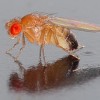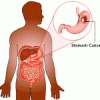Your Genes, Your Health

Model Organisms
Oct 12th
I asked a group of 5th graders the other day whether or not we can learn anything from studying other living things. For example, if we mutate or change the DNA of another organism, like fruit flies (D. melanogaster), can we learn anything about what can happen when human DNA changes? For this particular class, it seemed to be an absolutely absurd question. This could have been because the thought of fruit flies made them ill right before lunch, or they were unsure about how much we have in common with fruit flies.
So we got into a discussion about model More >

Will insulin come to the rescue of AD patients?
Sep 27th
Alzheimer disease (AD) is a neurodegenerative disease of the brain that is divided into early- and late-onset groups. AD is characterized by the build up of amyloid plaques, neurofibrillary tangles and the loss of connections between neurons. It is the most common type of dementia especially in the elderly. The exact causes of AD are elusive at the moment but are most likely the result of genetics and other factors. Scientist have been working hard to identify individual and or groups of genes responsible for the disease. Although the scientific community has identified may genes involved in early and late More >

Made to Order
Sep 12th
Preimplantation genetic diagnosis (PGD) is a technique that allows scientists to screen embryos after fertilization through In Vitro Fertilization (IVF), to prevent the transmission of serious genetic diseases for couples who are at risk. It also can be used to screen the egg and sperm before fertilization occurs. Only unaffected embryos will be transferred to the uterus for implantation.
Image from Nature Reviews Genetics 3, 941-955 (December 2002)
While this technology offers the hope to increase the success of IVF, it does raise some concerns about choosing a child in order to meet the needs and desires of parents. While most cases seem to have More >

Olive Oil and Nutrigenomics
Sep 28th
The effect of foods on gene expression is a fairly new area of science termed nutrigenomics. Many people are highly interested in how they may protect or prevent disease or conditions by applying diets appropriate to ones genetic make-up. Although early in its stages nutrigenomics has identified some very interesting findings. One interesting find was a clinical trial linking olive oils to the anti-inflammatory response
Extra virgin olive oil has been shown to reduce the expression of 98 genes involved in the inflammatory response by researchers from the University of Cordoba (Camargo A et al. 2010). Polyphenols are the primary beneficial More >

Could taking a nutritional supplement keep you young?
Jul 14th
It might be more real than not. Scientists working at the biotech giant Geron Corporation have isolated a molecule, TA-65, which has the ability to increase telomerase activity (It is important to note that his find has not been evaluated in published peer reviewed studies as of yet). This is an exciting breakthrough for telomerase is an enzyme that adds DNA sequence repeats to the 3′ end of DNA strands in the telomere regions, which are found at the ends of eukaryotic chromosomes. The telomeres contain condensed DNA material, giving stability to the chromosomes. These telomere DNA sequences shorten with More >

Getting an edge on breast cancer
Feb 3rd
Cancer is a life threatening disease characterized by uncontrolled growth of cells coupled with malignant behavior. The causes leading to cancer are believed to be genetic, environmental, or a combination of the two. Chemotherapy is one of a number of treatments for cancer. It utilizes a regiment of chemicals toimpair cell division and/or induce programmed cell death.
Research carried out by Dr Yang Li and colleagues at Harvard Medical School, the Technical University of Denmark, and the Université Libre de Bruxelles, have highlighted two genes – LAPTM4B and YWHAZ – that may inhibit the response of anthracycline-based adjuvant chemotherapy for breast More >

Mixed-up Nomenclature?
Jan 20th
An article in the December 24, 2009 issue of Molecular Cell, “A Reconfigured Pattern of MLL Occupancy within Mitotic Chromatin Promotes Rapid Transcriptional Reactivation Following Mitotic Exit,” had me thinking how misleading genes and proteins are often named. The publication details the function of a protein, Mixed Leukemia Lineage (MLL), which attaches to DNA prior to cell division. MLL “bookmarks” genes that need to be expressed immediately after the cell divides. The protein’s function is not, however, to cause leukemia. Its name – Mixed Lineage Leukemia – rather reflects the story of its discovery as it was found during research into More >

Fighting Obesity…
Dec 10th
Today there is a huge concern about obesity. It is a medical condition characterized by excessive body fat accumulated to a point where it has become a health issue. It is associated with high blood pressure, type 2 diabetes, sleep apnea, and heart disease – ultimately leading to reduced life expectancy. Obesity is a condition that can be caused by inactivity, excessive consumption of calories, or a genetic predisposition.
Scientists have used genome-wide studies to define a relationship between body mass index and polymorphisms in the FTO gene (Fat Mass and Obesity Associated Gene). Recently, insights into the function of the More >


